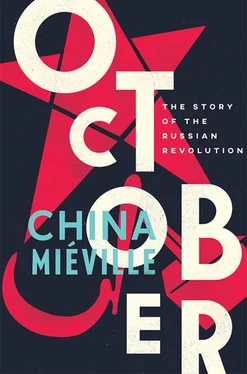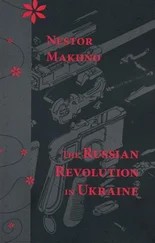But the state’s punitive expeditions spread out from the cities to reassert its authority, and the resilience of the radicals ebbs. By the time the revolt is finally put down, 15,000 have died – the great majority revolutionaries – and 79,000 are in prison or exiled. Pyotr Stolypin, governor of Saratov, earns infamy for his recourse to the gallows. The hangman’s noose becomes known as ‘Stolypin’s necktie’.
‘Better’, one workers’ slogan has it, ‘to fall a pile of bones than live like slaves.’
The rubble of the 1905 defeat and the subsequent repression put paid to any naivety about the regime’s goodwill, any residual faith in the tsar, and, for radicals, any hope of collaboration with ‘census society’, as the propertied classes and liberal intelligentsia are known. For most of that layer, the October Manifesto proves sufficient to justify capitulating, and the workers learn that they are alone.
What that knowledge stokes among the most ‘conscious’, the small, growing group of worker–intellectuals, autodidacts and activists, is an implacable class pride. A trenchant sense of culture, discipline and consciousness, of outright irreconcilability with the bourgeoisie. From now on from below come escalating calls not only for economic improvements, but also for dignity. One indignant grassroots soldiers’ song is clear in these priorities:
Sure we’d like some tea
But give us with our tea
Some polite respect
And please have officers
Not slap us in the face.
Soldiers and workers demand to be ‘respectfully’ addressed, in the courteous second-person plural, vy , rather than as ty , the singular, which is deployed from a position of authority.
In this fraught and protean political culture, the pride and shame of the oppressed are inextricable. On the one hand, there is the furious scolding one Putilov worker gives his son, when the young man ‘allows himself’ to be beaten by military officers for speaking positively of the Bolsheviks. ‘A worker should not endure a blow from a bourgeois,’ he shouts. ‘ “You hit me? – There, take one back.” ’ On the other hand there is the disgust one activist, Shapovalov, feels at his own impulse to cower, to avoid meeting his boss’s gaze. ‘It was as if two men were living inside of me: one who for the sake of the struggle for a better future for the workers was not afraid of sitting in the [jail of the] Peter and Paul Fortress and in Siberian exile: and another who had not fully liberated himself from the feeling of dependence and even fear.’
In reaction to such ‘slavish feelings’, he nurses a furious honour. ‘I came to hate capitalism and my boss… even more intensely.’
In March 1906, the grudgingly promised Duma meets. By now, though, the tsar’s government feels strong enough to clip the parliament’s already weak wings. Together, the Kadets, the Social Democrats – as the Marxists are known – and the narodnik Socialist Revolutionaries have a majority: the resulting programme of agrarian reform is anathema to the regime. Which, on 21 July 1906, therefore dissolves the Duma.
Radical attacks on government officials continue, but now the tide is with reaction. Peasants are tried under military law, to allow the death penalty. The tsar replaces the able Witte with the ruthless Stolypin, he of the ‘neckties’, sower of more bones. In June 1907, Stolypin peremptorily dissolves the follow-up Second Duma, arrests the Social Democratic deputies, restricts the vote, favouring property owners and nobility, and slashes non-Russian representation. It is on this rump franchise that the Third Duma is elected in 1907, and the fourth in 1912.
To modernise agriculture, the regime wants to break up the mir , the commune, and create a layer of smallholders. Stolypin gives peasants the right to buy individual plots. Progress is slow: still, by 1914 – three years after the assassination of Stolypin himself – some 40 percent of peasant households will have abandoned the mir . Only a few, though, will ever make it as small farmers. The poorest are instead forced to sell their tiny holdings, becoming agricultural labourers or migrating to the cities. Stolypin cracks brutally down on the peasant movement, leading the SRs to refocus somewhat toward work in cities.
These are hardly, though, a fertile arena. Around 1907–08, a new landscape of repression emerges. Strike rates are slashed. Revolutionaries are forced into miserable, defeated exile. By 1910, membership of the RSDWP collapses from 100,000 to a few thousand. Lenin, in Geneva and then Paris, clings to a pitiful optimism, managing to interpret any scrap – an economic dip here, an uptick in radical publications there – as a ‘turning point’. But even he grows despondent. ‘Our second period of emigration’, says Krupskaya, ‘was ever so much harder than the first.’
The Bolsheviks are riddled with informers. Their numbers plummet. They are destitute. The émigré insurrectionists have to seek any work to survive. ‘One comrade’, Krupskaya will recall, ‘tried to become a French polisher.’ The ‘tried’ is poignant. Among the left diaspora, despair, mental illness and suicide are not uncommon. In Paris in 1910, Prigara, a starving, deranged veteran of the Moscow barricades, visits Lenin and Krupskaya. His eyes are glassy, his voice loud. He ‘begins talking excitedly and incoherently about chariots filled with sheaves of corn and beautiful girls standing in the chariots’. As if he can see one of those peasant Arcadias, as if he can almost touch Nutland, Darya, Opona.
But he is closer to drowned Kitezh. Prigara escapes the protection of his comrades, ties stones to his feet and neck and walks into the Seine.
The twentieth century opens on a great, sluggard, contradictory power. The Russian empire stretches from the Arctic to the Black Sea, from Poland to the Pacific. A population of 126 million Slavs, Turks, Kirghiz, Tatars, Turcomen, countless others, gathered in wildly various polities under the tsar. Cities full of cutting-edge industries imported from Europe punctuate a vastness where four-fifths of the people are peasants tied to the soil, in near-feudal abjection. In the works of visionary artists like Velimir Khlebnikov, the self-styled King of Time, Natalia Goncharova, Vladimir Mayakovsky, Olga Rozanova, a strange modernist beauty illuminates a dominion where the great majority cannot read. Jews, Muslims, animists, Buddhists and freethinkers abound as, in the empire’s heart, the Orthodox Church propagates its lugubrious and ornate moralism – against which chafe dissenting sects, minorities, sexual dissidents in the cities’ queer hinterlands, radicals.
In his books 1905 and Results and Prospects , written shortly after the failed revolution, and throughout his life thereafter, Trotsky develops a particular conception of history as ‘a drawing together of the different stages of the journey, a combining of separate steps, an amalgam of archaic with more contemporary forms’. Capitalism is an international system, and in the interrelations of cultures and polities, history does not clean up after itself.
‘A backward country assimilates the material and intellectual conquest of the advanced countries,’ Trotsky will come to write. ‘Though compelled to follow after the advanced countries, a backward country does not take things in the same order.’ It is driven to
the adoption of whatever is ready in advance of any specified date, skipping a whole series of intermediate stages… [though it]… not infrequently debases the achievements borrowed from outside in the process of adapting them to its own more primitive culture… From the universal law of unevenness thus derives another law which… we may call the law of combined development .
Читать дальше











